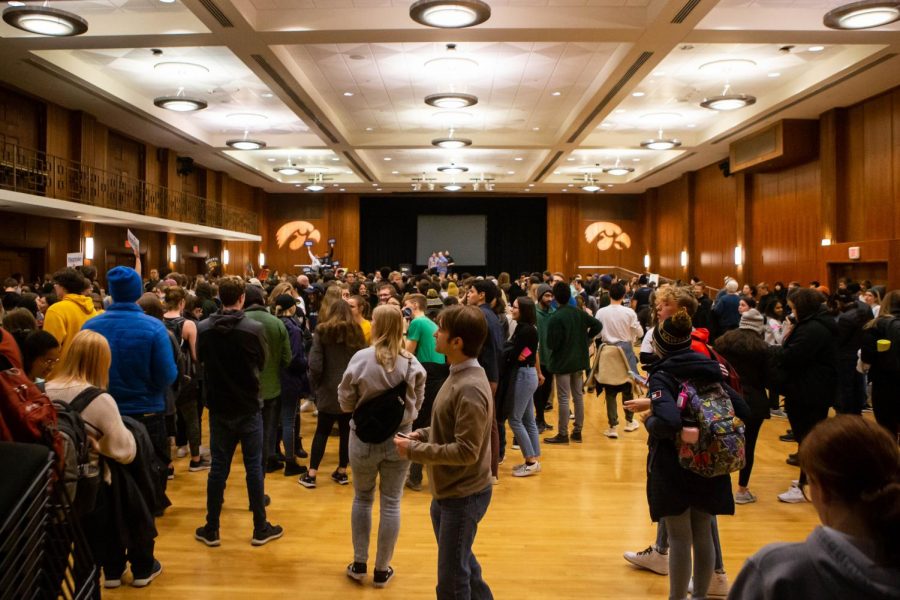Iowa GOP retains first-in-the-nation caucuses; Democrats determined amid uncertainty
Iowa GOP Chair Jeff Kaufmann said Iowa will be first in the 2024 presidential calendar, but a recent bylaws change from the Democratic National Committee means Democrats may not keep their spot.
University of Iowa students caucus at the Iowa Memorial Union on Monday February 3, 2020.
April 14, 2022
Iowa Republicans affirmed the position of the 2024 GOP caucuses after the Democratic National Committee moved Wednesday to strip Iowa of its guaranteed first-in-the-nation status on the Democrats’ presidential calendar.
The Republican National Committee voted on Thursday to keep the presidential nominating calendar in place, Iowa GOP Chair Jeff Kaufmann said in a press conference, meaning the Iowa caucuses will lead the calendar on the Republican side in 2024.
Kaufmann, a staunch defender of Iowa’s place in the presidential process, leads the RNC’s Presidential Nominating Process Committee.
“Ultimately the committee did have several amendment suggestions but none of them affected the carveout processes and specifically Iowa being first in the nation,” Kaufmann told reporters on Thursday.
The Republican announcement comes after the DNC Rules and Bylaws Committee voted to strip the first four states in the presidential nominating calendar of their guaranteed spots. The party’s new policy allows states to apply for exemptions to hold their primary or caucuses before the first Tuesday in March, the official start of the primary window.
Iowa has held the first place in the nominating calendar since 1972, when the Democratic Party scheduled its caucuses early after a rule change at the 1968 Democratic National Convention. Presidential candidates flood Iowa in the months before the caucuses for large rallies and small meet-and-greets hoping to win the support of Iowans.
Currently, Iowa, New Hampshire, Nevada, and South Carolina are the first four states on the road to the presidential nomination.
In a draft resolution first reported by the Des Moines Register in March, the Democratic Party noted that it would review states based on their diversity — including ethnic, geographic, and union representation — competitiveness, and ability to administer an inclusive nominating process.
Iowa, with a population that is more than 90 percent white, is not as diverse as other early states like Nevada and South Carolina.
“Iowa will absolutely be applying to be in the early window and we will look forward to enthusiastically making our case,” Iowa Democratic Party Chair Ross Wilburn wrote in a prepared statement. “The Iowa Democratic Party will also be engaging with numerous stakeholders all over Iowa to explore substantive changes to the caucuses that would make them more straightforward, transparent and accessible.”
The resolution passed does not allow the committee to preference primaries over caucuses, the Register reported. Iowa’s representative to the committee voted against the resolution because the state party felt some members “appear to have pre-judged an outcome with respect to caucuses,” Wilburn wrote.
Unlike a primary election, in which voters quickly visit polls that are open for upwards of 15 hours a day, caucusgoers need to be at a specific place for an evening, often braving bad weather in late January or February. This has caused criticism that the process isn’t accessible.
State parties agree on keeping caucuses first
Kaufmann and Wilburn don’t often agree, but Kaufmann said on Thursday he supports the state Democrats’ bid to remain first in the nation. He said problems would arise for both parties if they did not hold their caucuses together.
“I think the state is gonna be stronger if we go together, and I think the process is gonna be stronger,” he said. “I’m still gonna stand with them. I’m hoping that this is going to get noticed by the national party.”
Kaufmann said if the national Democrats revoke Iowa’s first-in-the-nation status in 2024, it would be sending a message that the party does not care about rural and Midwestern voters.
Reynolds defends the caucuses
Iowa Gov. Kim Reynolds, a Republican, said during Thursday’s press conference that Iowa should remain as the first stop to the presidency because of Iowa voters’ ability to vet candidates.
“It’s a tremendous opportunity for candidates to hone their message, to hear the tough questions, and have a conversation about what’s happening not only in the country today, but what their expectations are moving forward,” Reynolds said.



